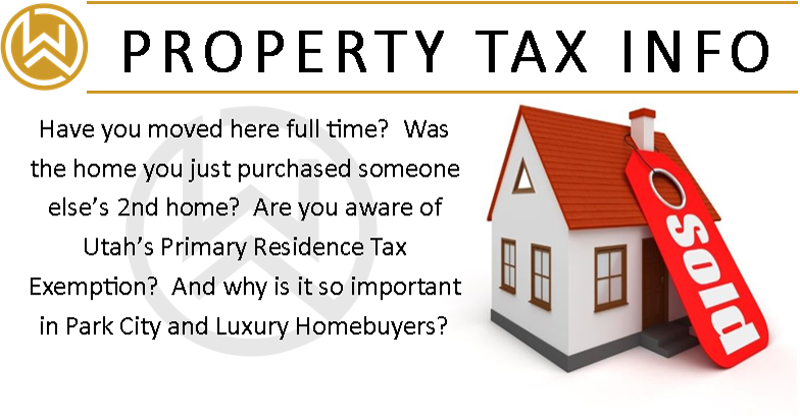
Park City Property Taxes: A Must-Know for Luxury Home Buyers
Park City is a highly desirable place for property owners looking to relocate or purchase a second home. But with homeownership comes the responsibility of understanding local property tax laws — and over the past 25+ years of helping clients buy and sell real estate in Summit and Wasatch Counties, I've heard just about every property tax question imaginable. One of the most common, especially from out-of-state buyers, is: "What is the property Tax Rate in Utah?"
How Property Taxes are Calculated in Utah
Plus: Why Tax Rates Vary Across Park City and Summit County Neighborhoods.
In Utah, property taxes are a joint effort between the state and local counties. While the state provides oversight and sets specific standards, it is the county governments, such as Summit and Wasatch, that are responsible for assessing properties and setting tax rates.
The tax rate itself is determined by a combination of local taxing entities, which may include school districts, fire departments, recreation centers, local bonds, and other service providers. This is why property owners can see different rates even within the same town or Zip code. I have seen rates range from 0.0059 to 0.0092, with the school district playing a significant role in determining these rates. There are more than 60 tax areas in Summit County alone, which means your effective tax rate can shift slightly depending on the location of your home.
To determine your annual property tax bill, the County Assessor evaluates your property to determine its market value and then applies the applicable assessment rate, along with any qualifying exemptions or abatements.
Understanding Market Value
The Summit County Assessor’s Office is tasked with determining the fair market value for all taxable properties in Park City. According to the Utah State Tax Commission (and affirmed by the Supreme Court), market value is defined as:
The price a property would sell for in a competitive and open market between a willing buyer and a willing seller, with neither party under pressure to buy or sell.
Example:
- Land Value: $638,000
- Improvement Value: $1,755,300
- Total Market Value: $2,393,300
This market value then becomes the basis for calculating your property tax, before any exemptions are applied.
What Is the Utah Primary Residence Exemption?
One of the most impactful tools available to Utah homeowners is the Primary Residence Exemption — a tax benefit designed to ease the financial burden on those who live in their homes year-round. A property that is granted a primary residence exemption is only taxed at 55% of the market value of the home and up to one acre of land. Whether you're new to the area or simply reassessing your current tax status, understanding how this exemption works is key to making informed, cost-effective decisions. It applies to:
- Owner-occupied primary residences
- Properties rented to a single tenant on a long-term (year-round) basis
Properties used as second homes or vacation properties (such as Airbnb or VRBO) are not eligible for this exemption and are taxed at 100% of their assessed value.
While the rates increase on second homes and vacation rentals, they are still lower than what you'll find in other popular luxury real estate markets. Utah property taxes are the seventh-lowest in the country, making them quite an attractive option for those in the high-end home market.
Example of Primary Residence Exemption Tax Impact
Let’s revisit the earlier example with a market value of $2,393,300. If this property qualifies for the Primary Residence Exemption:
- Assessed Value Without Exemption: $2,393,300.
- Assessed Value With Exemption: $1,316,315 (55% of market value)
That reduction in "taxable value" will translate to thousands of dollars in annual savings, depending on the applicable tax rate for your property’s location.
How to Qualify & Apply for the Exemption
Don’t assume that just because you live in the home full-time, the county has recorded it as your primary residence. If you’ve recently purchased a property, you’ll need to complete and submit an Application for Residential Exemption with the county assessor's office to receive the benefit
You may qualify if:
- You live in the home as your primary residence for at least 183 days per calendar year, or
- You rent the property to a single tenant on a long-term (year-round) basis
- The property is not used as a short-term nightly rental (such as Airbnb or VRBO)
- You are not claiming the exemption on another property in Utah
How to Apply:
- Download the application from your county's website:
- Complete the form and provide any requested documentation, such as a driver’s license, that shows the property address.
- Submit the application to your county assessor’s office by May 1st of the year you’d like the exemption to apply.
Once approved, the exemption will remain in effect unless there is a change in occupancy or ownership.
Link to change the address on Utah driver's license:
Have Questions? Let's Connect
If you're unsure whether you qualify for the Primary Residence Exemption, need help understanding your current property tax status, or just want expert insight into buying or owning property in Park City, Summit County, or Wasatch County — I’m here to help.
Reach out anytime for personalized guidance or to schedule a quick consultation. Making informed decisions now can lead to meaningful savings in the long run.